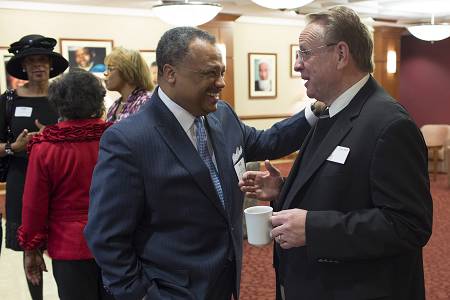by Tess Rivers
This is not your father’s Southern Baptist Convention.
That’s a message SBC President Fred Luter wants an increasingly diverse generation of young evangelicals to hear.

“Our
challenge as Southern Baptists is to let young believers know that you are welcome at the table,” said Luter, who met recently with International Mission
Board (IMB)
leadership and staff at the home office in Richmond, Va. “We want
you to come, sit at the table and tell us what we can do to help you fit in more
with this convention.”
The SBC’s first African-American president, Luter also is encouraging ethnic minorities, particularly African Americans, to look to international missions as a means of expanding God’s kingdom. Of IMB’s 4,900 missionaries, 27 are African American, 79 are Hispanic and 317 are Asian.
For African Americans, that’s one-half of 1 percent of the total IMB
missionary count, explains Keith Jefferson, IMB’s African American church
missional strategist. When compared to as estimated 1 million African
Americans included in the SBC’s 16 million members, “that’s a disproportionately
low number of African Americans serving overseas,” he said.
Although, African Americans have served in spurts with the IMB (formerly the Foreign
Mission Board) since shortly after the SBC began in 1845, the low number serving
overseas today doesn’t surprise Luter. “A lot of our African American
churches are in the ‘hood,” said Luter, who pastors Franklin Avenue Baptist
Church in New Orleans, La. “It’s a daily fight every day. [People ask me], ‘Why
do I need to go to Africa, Asia or Europe? We need to get people saved in this
community.'” Luter aims to change that mindset. Jefferson hopes to help
him.
“It’s about the approach,” Luter said. “We need to reach the people in our neighborhoods and get African Americans out on the foreign field.” Jefferson agreed. “Charity begins at home, but it doesn’t end there. The command begins in Jerusalem, but we don’t stop at the beginning.”
A RENEWED COMMITMENT
As SBC president, Luter has three specific goals to promote the importance of international missions: model a personal commitment, educate churches about needs and instill a vision for the world in the hearts of young people.
To accomplish goal No. 1, Luter is excited about going on his first trip to the Horn of Africa later this year “I’m like a kid in a candy store,” he said, laughing. “I’m going to enjoy the time and learn as much as I can.”
However, the vivacious pastor hopes to do more than simply model and learn. He also plans to leverage his international experience to educate his church and others about overseas needs. “I’m going to bring it back to my people and light a fire in them,” Luter said. “Next time, I want to bring a group from Franklin Avenue. Let’s keep this thing
going!”
A third goal is to encourage and challenge young people — particularly African Americans — to consider international missions as a career choice. Both Luter and Jefferson agree that the missionary challenge is under-communicated in many black churches. It’s one Luter is now taking personally.
“Granted, some (young people) want to be nurses, doctors or attorneys. Some want to be football players or basketball players, but a lot … can be missionaries,” Luter said. “I never heard that all my life in the church I grew up in … I don’t hear it being said in the church I pastor now.”
“As SBC president, I will let African American churches know that we desperately need more African Americans on the mission field,” Luter continued. “I want to challenge pastor[s] to start with your young people.”
A RICH HISTORY
It isn’t that African Americans haven’t been open to serving overseas, Jefferson said. In fact, as early as 1783, freed South Carolina slave and preacher George Leile moved his family to the Caribbean. By 1784, he had founded the First Baptist Church of Kingston,
Jamaica, and grown it to more than 400 members.
“We have a rich history in missions,” Jefferson said. The historical record bears that out.
While Leile and others like him were early pioneers, most church historians –including David Cornelius, a former IMB missionary who now serves as an IMB consultant for African American mobilization — credit Lott Carey, a former slave and Virginia native, as the “first” African American missionary because mission societies of the day sent and supported him.
Writing in the fourth edition of “Perspectives on the World Christian Movement,” published in 2009, Cornelius describes how Carey sailed for West Africa with his family on
Jan. 16, 1821, six years after organizing the African Baptist Foreign Mission Society, the first such organization founded by African Americans in the United States. This group, along with the General Missionary Convention of the Baptist Denomination in the United States (known simply as the Triennial Convention because it met every three years), helped support Carey as he shared the Gospel and planted churches in Liberia.
Carey died in an explosion in 1828, but African Americans continued to participate in international missions over the next two decades. Then, after the issue of slavery reached a critical stage in the 1840s, Southerners formed the Southern Baptist Convention, which included establishing the Foreign Mission Board in 1845.
Although pro-slavery in its sentiments, the SBC was committed to the “spiritual welfare of blacks and slaves,” Cornelius writes, and within a year the Foreign Mission Board appointed its first black missionaries — John Day and A. L. Jones. Both men were already
serving in Liberia with other organizations but came under the auspices of the FMB in 1846. An 1855 article from the The Home and Foreign Journal notes that Jones died before news of the appointment reached Africa.
African Americans continued to go overseas as missionaries through the 1870s, Jefferson
explained. Then, as Jim Crow laws enforcing racial segregation began to take root, many opportunities for blacks and whites to work together ended. Segregation also shut down sending black missionaries.
It wasn’t until the 1967 appointment of Sue Thompson — the first black female missionary — that opportunities for blacks to serve internationally through the FMB resumed. Since then, a small but steady stream of African Americans — both men and women–have followed the examples of Leile, Carey and Day. “Our ancestors didn’t say, ‘We’ve got to take care of Jerusalem before we go,'” Jefferson, who served 16 years with the IMB in Brazil, said. “No, some of them had the call and they went.”
While Jefferson reminds blacks of these early models of commitment, IMB President Tom Elliff acknowledges that the FMB’s history was “monolithic” during the years of segregation. He isn’t proud of it, he said, but he’s pleased that today the IMB looks more like the family of God than ever before.
“We should look like God’s people, rather than what some people thought God’s people should look like,” Elliff said. “That’s why every orientation for new IMB personnel includes some from ethnic churches.”
A SLEEPING GIANT
Revolutions in transportation and communication, increased affluence of African Americans and a growing number of black congregations in the SBC reveal that African American evangelicals are a “sleeping giant,” Jefferson said. A recent North American Mission Board study supports this — reporting that since 1998, the number of African American congregations within the SBC has increased by 82.7 percent.
With 1 billion people of color around the world, Jefferson also understands the urgency
of taking the Gospel to the people of the world who do not know Christ. Whether they serve in East Asia, the Middle East, Eastern Europe or Africa, “today is the day for African Americans,” Jefferson said. “Yesterday was the day for African Americans, but today is the day for African Americans to become more involved in world missions.”
To learn more about how African Americans can get involved in international missions, contact Keith Jefferson, African-American Missional Church Strategist, at (800) 999-3113, ext. 1422, or email [email protected].
Visit commissionstories.com to view a multi-media package about “Celebrating African Americans on Mission.”–Baptist Press




Comments are closed.